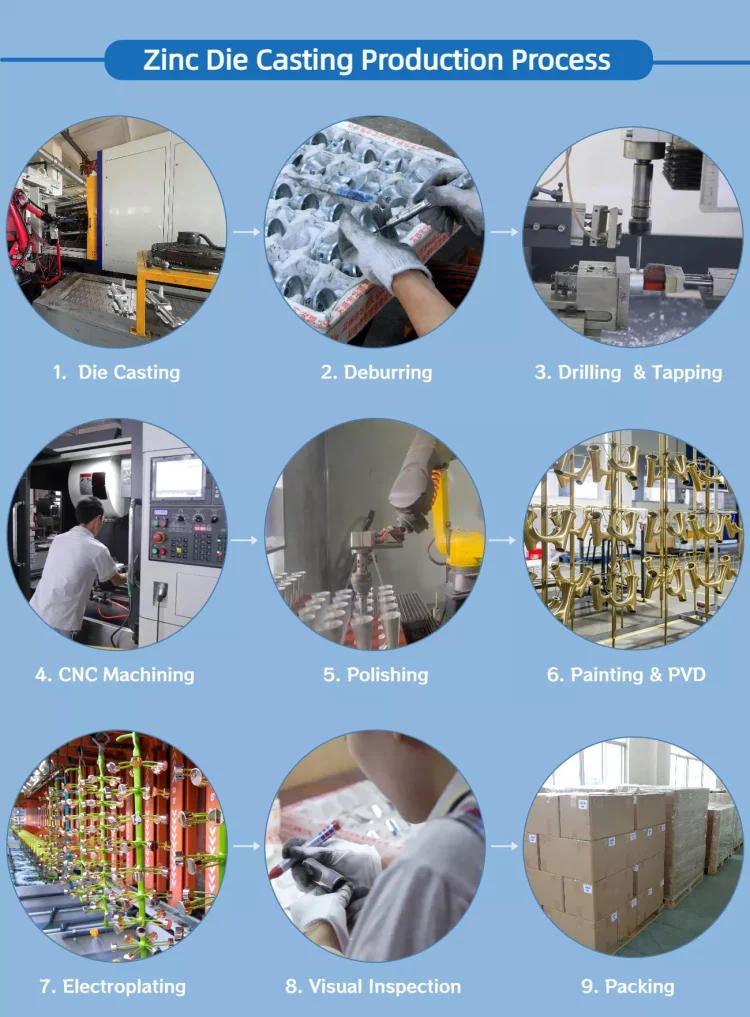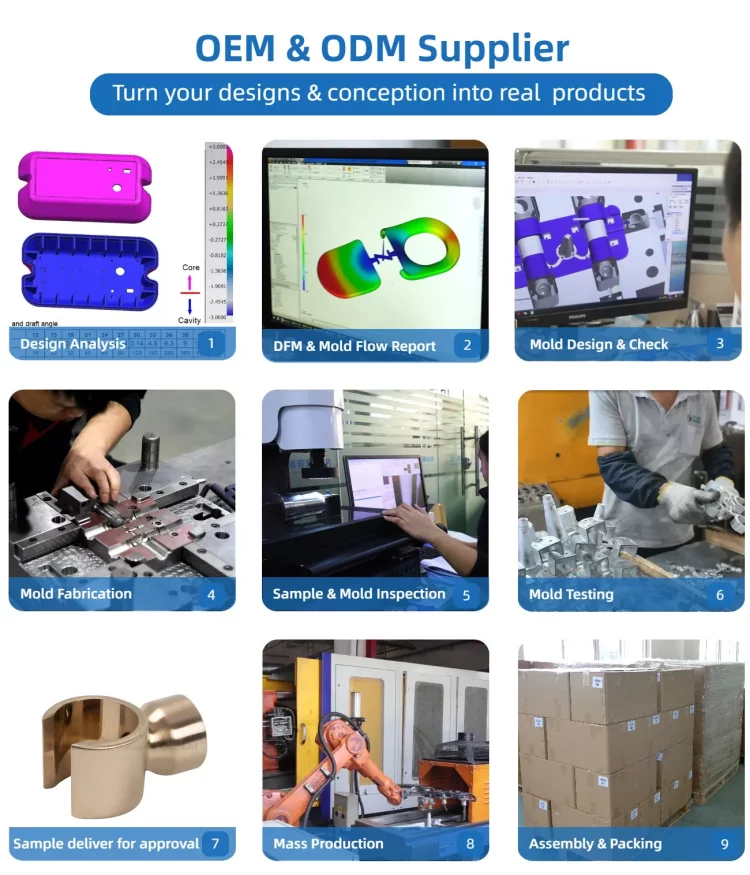Choosing the right zinc alloy die casting partner is one of the most important decisions in your product development and manufacturing process. The right factory doesn’t just deliver parts—it delivers reliability, precision, and peace of mind. On the other hand, a poor choice can result in production delays, substandard components, increased costs, and damaged customer relationships.
So how do you identify a truly capable and trustworthy partner? This practical guide outlines the essential criteria to evaluate, helping you make a confident, informed decision that supports your quality standards, timelines, and business goals.
Choosing the Right Zinc Alloy Die Casting Partner: A Comprehensive Guide
When selecting a zinc alloy die casting factory, it’s essential to go beyond price and delivery times. The right partner should combine technical excellence, rigorous quality control, engineering collaboration, and long-term reliability. Here’s how to evaluate potential manufacturers—and why these factors matter.

zinc die casting process
—
1. Scrutinize Their Technical Capabilities and Expertise
A strong technical foundation is non-negotiable for consistent, high-quality results.
Alloy Expertise
Does the manufacturer work with key zinc alloys such as Zamak 3, Zamak 5, and ZA-8? More importantly, can they recommend the optimal alloy based on your application’s requirements—whether you need superior strength, enhanced corrosion resistance, or a flawless surface finish?
Advanced Equipment:
Look for modern, well-maintained die casting machines, automated production lines, and precision tooling. These reflect a commitment to consistency, efficiency, and product integrity.
In-House Secondary Operations:
A true full-service partner offers integrated secondary processes—including trimming, deburring, CNC machining, tapping, polishing, plating, painting, and powder coating. This vertical integration streamlines your supply chain and ensures tighter quality control from raw material to finished part.
At Zamak Die Casting, we utilize state-of-the-art equipment and deep materials science knowledge to produce everything from intricate thin-walled components to high-volume production runs—all backed by comprehensive in-house finishing and assembly capabilities.
—
2. Evaluate Their Quality Control System
Quality must be embedded in every step—not just inspected at the end.
Certifications:
Prioritize partners certified to international standards such as IATF 16949 (automotive) or ISO 9001. These validate a structured approach to process management, continuous improvement, and customer satisfaction.
Inspection & Testing Protocols:
Ask about their use of Statistical Process Control (SPC), Coordinate Measuring Machines (CMM), X-ray analysis for porosity detection, and spectrometers for material verification. These tools ensure dimensional accuracy and material integrity across batches.
Comprehensive Documentation:
Reliable suppliers provide detailed records, including First Article Inspection Reports (FAIR), material traceability certificates, and full-dimensional reports, giving you confidence in every shipment.
—
3. Assess Their Tooling Design and Maintenance Practices
The mold is the cornerstone of die casting performance and longevity.
- Engineering & Mold Design Capability:
Does the factory have an experienced in-house engineering team capable of designing, simulating, and optimizing molds using advanced software? Early collaboration during the Design for Manufacturability (DFM) phase can prevent costly design flaws and accelerate time-to-market.
-Tool Steel Quality & Preventive Maintenance:
High-performance molds require premium-grade tool steels and a disciplined maintenance schedule. Proper care extends mold life, reduces downtime, and ensures consistent part quality over millions of cycles.
At www.zamakdiecasting.com, our engineers collaborate closely with clients from concept through production. We use top-tier tool steels and follow a rigorous preventive maintenance program to maximize tool durability and output quality.
—
4. Consider Industry Experience and Project Management
Experience matters—especially when meeting industry-specific demands.
- Relevant Industry Background:
Has the factory produced parts for sectors like **automotive, electronics, hardware, or consumer goods? Familiarity with regulatory standards, environmental conditions, and functional testing protocols gives them a critical edge.
- Communication & Transparency:
Your contact should be responsive, proactive, and technically knowledgeable. A trustworthy partner keeps you informed throughout the project lifecycle and addresses challenges head-on.
- Sample Development Process:
A smooth, efficient prototyping phase reflects strong project management and technical competence. It demonstrates the factory’s ability to turn your design into a precise, functional reality.
—
5. Analyze Commercial Terms and Scalability
Operational flexibility and fair business practices are vital for long-term success.
- Transparent Pricing:
Be cautious of abnormally low quotes. Unrealistically cheap pricing may indicate substandard materials, compromised processes, or unsustainable labor practices. Seek fair, itemized pricing that reflects real value.
- Reliable Lead Times:
Accurate forecasting depends on realistic timelines—from tooling development to first article approval and full production launch.
- Scalability:
Can the factory support your growth? Whether you’re running prototypes, low-volume trials, or scaling to mass production, your partner should adapt seamlessly to changing demand.
—
Your Next Step: Ask the Right Questions
Equip yourself with these critical questions during supplier evaluations:
- “Can I review your quality certifications and a sample inspection report?”
- “What does your Design for Manufacturability (DFM) feedback process look like?”
- “Which secondary operations do you perform in-house?”
- “Can you share case studies or examples of similar projects in my industry?”
- “What is your typical lead time from tooling approval to first production batch?”
—
Conclusion: Build a Partnership for Success
Selecting a zinc die casting supplier isn’t just about sourcing parts—it’s about forging a strategic partnership. The best collaborators bring technical depth, unwavering quality, engineering insight, and transparent communication to the table.
When you choose Zamak Die Casting, you’re choosing more than a vendor—you’re gaining a committed partner focused on your product’s performance, reliability, and market success.

Zinc die casting
About Zamak Die Casting: Your Trusted Expert in Zinc Metal Components
As a leading manufacturer of zinc alloy die castings, we specialize in precision die casting solutions for high-performance zinc metal components. With extensive expertise in zamak die casting, we deliver consistent quality and reliability for high-volume production of critical parts—ranging from durable zinc alloy lock hardware to sleek, long-lasting zinc alloy bathroom fixtures.
We use premium-grade zinc alloys to produce complex, thin-walled castings with excellent dimensional accuracy, strength, and surface finish. Our capabilities serve a wide range of industries, including automotive, electronics, plumbing, and hardware. From initial design support and prototyping to final finishing and assembly, we oversee every step of the manufacturing process to ensure superior product performance and consistency.
When you partner with us, you gain more than just a supplier—you gain a reliable collaborator committed to excellence in zinc die casting. Discover how our advanced casting solutions can enhance your next project. Visit www.zamakdiecasting.com to learn more and start your custom zinc casting solution today.